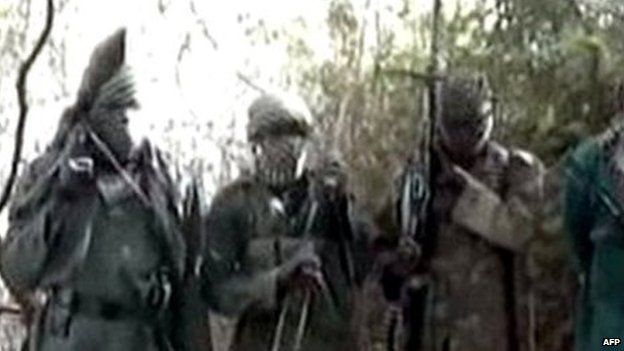Nigerian women and girls 'escape from Boko Haram'
- Published

More than 60 women and girls are reported to have escaped from the Nigerian Islamist group Boko Haram, security sources say.
They were among 68 abducted last month near the town of Damboa in north-eastern Borno state.
But some women who made it home said they feared other escapees had been recaptured, villagers told the BBC.
Boko Haram is still holding more than 200 schoolgirls abducted from Borno's Chibok town in April.
The BBC's Nigeria correspondent Will Ross says the insecurity is so rife in Borno state and the access so poor that it is not yet clear exactly how many of the young women managed to escape from Boko Haram.
'Dogs began barking'
Initial reports said the women escaped when the militants went to attack a military base near Damboa on Friday.
The Nigerian military said it killed more than 50 rebels in a clash that night.
Local vigilante Abbas Gava told journalists he had "received an alert from my colleagues... that about 63 of the abducted women and girls had made it back home".
"They took the bold step when their abductors moved out to carry out an operation," he said.
But 18 women who have made it back to villages around Damboa over the last three days - and are being treated at a hospital in Lasa village - said the militants were asleep when they escaped, a Lasa resident told the BBC Hausa Service.
Other relatives told the BBC that the women recounted how they climbed over a wall on Thursday night into Friday morning - and immediately began running away.
Dogs then started barking, which woke up the militants who started shooting at them, the women told the villagers.
They said they feared a significant number of them were subsequently recaptured.
"They're looking very distressed and very lean… they have gone through a very terrible ordeal," the Lasa resident told the BBC.
"We're waiting to hear from the government whether they will assist with treating and rehabilitating them."
The authorities say they have no further details about the escape.
Boko Haram triggered an international outcry when it captured 200 girls in Borno's Chibok town on 14 April.
It is demanding the release of its fighters and their relatives in exchange for the girls but the government has rejected this.
Last week three women were arrested for recruiting female members for the militant group, the country's military said.
They were said to have targeted widows and young girls, promising them marriage to Boko Haram members.
A state of emergency is in force in northern Nigeria because of the group's increasingly violent campaign to overthrow the government and create an Islamic state.
The city of Maiduguri was the headquarters of Boko Haram until it was forced out by the military and vigilante groups.
The year following emergency rule has been the most violent since their insurgency began in 2009, with at least 3,300 people killed in Boko Haram-related violence since January.
Who are Boko Haram?
- Founded in 2002
- Initially focused on opposing Western education - Boko Haram means "Western education is forbidden" in the Hausa language
- Launched military operations in 2009 to create an Islamic state
- Thousands killed, mostly in north-eastern Nigeria - but also attacks on police and UN headquarters in capital, Abuja
- Some three million people affected
- Declared terrorist group by US in 2013